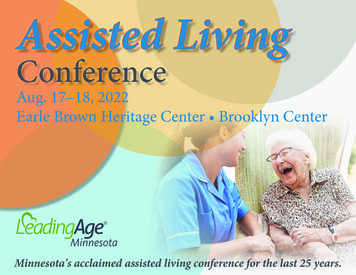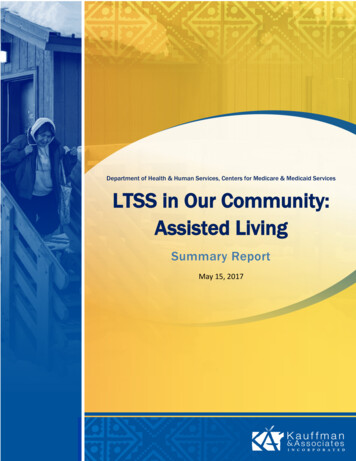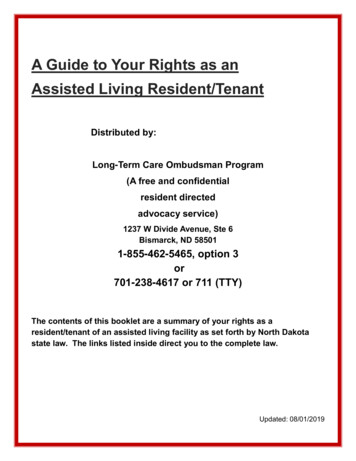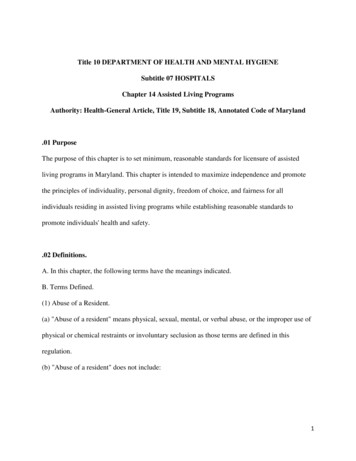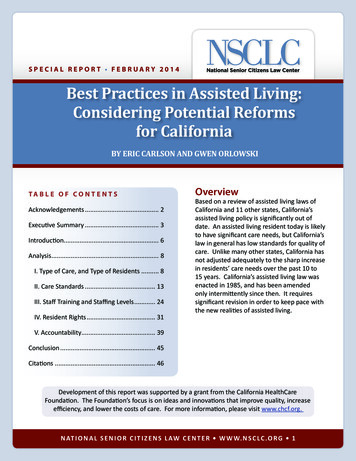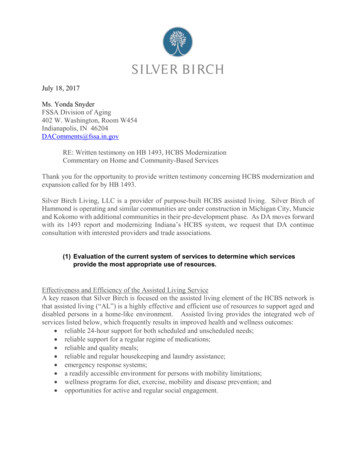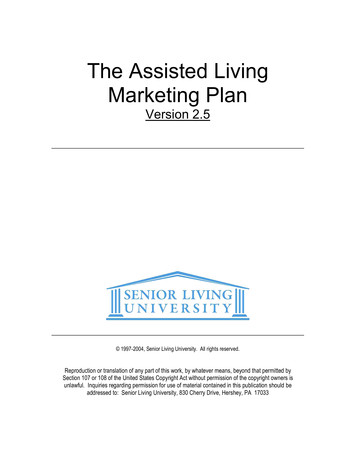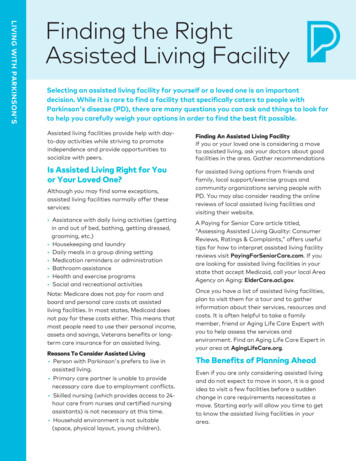
Transcription
LIVING WITH PARKINSON'SFinding the RightAssisted Living FacilitySelecting an assisted living facility for yourself or a loved one is an importantdecision. While it is rare to find a facility that specifically caters to people withParkinson's disease (PD), there are many questions you can ask and things to look forto help you carefully weigh your options in order to find the best fit possible.Assisted living facilities provide help with dayto-day activities while striving to promoteindependence and provide opportunities tosocialize with peers.Is Assisted Living Right for Youor Your Loved One?Although you may find some exceptions,assisted living facilities normally offer theseservices: Assistance with daily living activities (gettingin and out of bed, bathing, getting dressed,grooming, etc.) Housekeeping and laundry Daily meals in a group dining setting Medication reminders or administration Bathroom assistance Health and exercise programs Social and recreational activitiesNote: Medicare does not pay for room andboard and personal care costs at assistedliving facilities. In most states, Medicaid doesnot pay for these costs either. This means thatmost people need to use their personal income,assets and savings, Veterans benefits or longterm care insurance for an assisted living.Reasons To Consider Assisted Living Person with Parkinson's prefers to live inassisted living. Primary care partner is unable to providenecessary care due to employment conflicts. Skilled nursing (which provides access to 24hour care from nurses and certified nursingassistants) is not necessary at this time. Household environment is not suitable(space, physical layout, young children).Finding An Assisted Living FacilityIf you or your loved one is considering a moveto assisted living, ask your doctors about goodfacilities in the area. Gather recommendationsfor assisted living options from friends andfamily, local support/exercise groups andcommunity organizations serving people withPD. You may also consider reading the onlinereviews of local assisted living facilities andvisiting their website.A Paying for Senior Care article titled,“Assessing Assisted Living Quality: ConsumerReviews, Ratings & Complaints,” offers usefultips for how to interpret assisted living facilityreviews visit PayingForSeniorCare.com. If youare looking for assisted living facilities in yourstate that accept Medicaid, call your local AreaAgency on Aging: ElderCare.acl.gov.Once you have a list of assisted living facilities,plan to visit them for a tour and to gatherinformation about their services, resources andcosts. It is often helpful to take a familymember, friend or Aging Life Care Expert withyou to help assess the services andenvironment. Find an Aging Life Care Expert inyour area at AgingLifeCare.org.The Benefits of Planning AheadEven if you are only considering assisted livingand do not expect to move in soon, it is a goodidea to visit a few facilities before a suddenchange in care requirements necessitates amove. Starting early will allow you time to getto know the assisted living facilities in yourarea.
LIVING WITH PARKINSON'S FINDING THE RIGHT ASSISTED LIVING FACILITYQuestions to Ask a Potential Assisted Living FacilityRefer to the questions on the following pages for guidance. Try to make a second, unannounced visit inthe evening or on a weekend. You may learn additional information that adds to your overall opinion ofthe facility.First Glance Considerations: Is the environment in good repair, clean and free of odors? Does the staff seem friendly and approachable? Can residents access outdoor spaces? Are the outdoor spaces well-maintained?Notes:Care Questions: What is the medication schedule? How can I be sure my loved one receives their Parkinson’smedications on time, every time? What is the staff-to-resident ratio? Does this change during the overnight hours? Are there on-site rehabilitation services (physical, occupational and speech therapies) and counselingservices? If not, does the facility contract with an outside provider or can I hire one? In the event of a medical emergency, can my loved one be taken to our preferred hospital? What kind of Parkinson’s training does staff receive? How does the staff determine a care plan?Notes:
LIVING WITH PARKINSON'SSocial & Wellness Opportunities: What spiritual and/or religious services are offered to residents? In what ways are residents’ lives enriched (music therapy, art therapy, animal therapy, etc.)? Can I seean activities calendar? What programs provide cognitive stimulation? What types of fitness classes and fitness equipment are available?Notes:Dining Questions: Can you see a food menu? See the Nutrition fact sheet for more information on nutritional needsof people with Parkinson's at Parkinson.org/Library. Are there snacks available and are they easily accessible? How does the staff accommodate special dining needs (diet, eating assistance and adaptivedevices)? If you are unable to eat in the dining room, is there a charge for in-room meal service?Notes:
LIVING WITH PARKINSON'S FINDING THE RIGHT ASSISTED LIVING FACILITYFinancial Questions: What are the monthly charges? Can I receive an itemized bill each month? Can additional services be added to your monthly bill without my permission? How often are grooming/salon services available on-site? What is the cost for a haircut, style,manicure, etc.?Notes:When you have found the assisted living facility of your choice, you will usually be asked to put downa deposit to hold the apartment. A member of their staff will complete a screening with you or yourloved one to confirm that your needs are within their scope of care. The information from thisscreening, together with the paperwork provided by your or your loved one's physicians, will be usedto create a care plan. The monthly assisted living cost will be determined from this care plan andmay or may not increase as the level of care needed increases or as rates change year to year.For more information or access to local services, call the Parkinson’s Foundation Helpline at1-800-4PD-INFO (473-4636).Considerations if Your Loved One Has DementiaIf your loved one needs more care due to dementia, you may need to look for a memory careenvironment.Some skilled nursing facilities will have a dedicated “memory care” section with security featuresthat keep residents with dementia from leaving without assistance. Memory care staff are oftenrequired to complete state-regulated dementia training. Many memory care wings also offer socialand recreational programs designed for people in various stages of dementia.Skilled nursing facilities serve residents with dementia in both the general and memory care wings,but the goal is to look for the setting that will best support your loved one. If feasible, visit varioustypes of facilities nearby. While touring a non-memory care specific part of the building, try togauge whether your loved one will receive the necessary support. For safety or interpersonalreasons, they may be supported more adequately in a memory care setting.800. 4PD.INFO (473.4636)helpline@parkinson.orgparkinson.org2020
LIVING WITH PARKINSON'SMemory Care Questions: What dementia training does the staff receive? How are they coached to communicate effectivelyand support the behavioral symptoms of dementia? How is staff required to keep their trainingcurrent? How are the social and recreational programs adapted for people in various stages of dementia?What recreational programs can staff recommend for my loved one? How is the building or layout of the memory care community tailored to be supportive to people withdementia? How is exiting the building without staff or family assistance prevented? How does staff learn about residents’ likes, dislikes, and interests? How is this information utilized toinform the care plan?Notes:For more information or references to local services, call the Parkinson’s Foundation Helplineat 1-800-4PD-INFO (473-4636).800. 4pD.inFo (473.4636)helpline@parkinson.orgparkinson.org2020
Finding An Assisted Living Facility If you or your loved one is considering a move to assisted living, ask your doctors about good facilities in the area. Gather recommendations for assisted living options from friends and family, local support/exercise groups and community organizations serving people with PD. You may also consider reading the .


